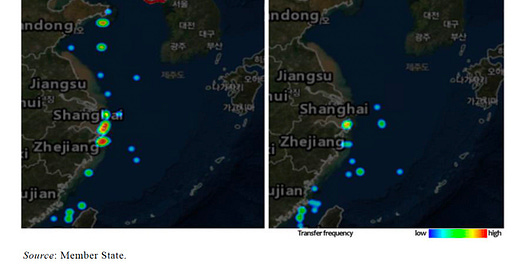UN PoE highlights; PRC helping NK evade sanctions; Breaking oil trade between Tehran and Beijing would be difficult
Prohibited Transactions for the week of 6 Nov 2023 (#27)
North Korea
Some highlights from the midterm 2023 UN Panel of Experts (PoE) report. //Three items of interest below. Also, in the past there have been reports about the PRC (and to a lesser extent Russia) hindering the PoE’s work, but I feel Beijing’s intransigence has died down a bit. This current report and the previous three (2022 final report and onward) seem to be more robust and detailed than before, which is something we will all benefit from. Also, this is a minor point, but ever since the 2022 midterm report, the wording “Taiwan, Province of China” is no longer used when Taiwanese cities are mentioned, which, as I understand it, the PRC representative had always insisted on. Not sure what’s going on, but let’s see if this trend continues with the final report in the spring.
Figure VI from page 17 of the report is a heatmap of known areas where North Koreans engage in illicit ship-to-ship (STS) transfers. The map on the left shows all known 2022 activity, and the map on the right shows known activity for the first half of 2023. Activity in Chinese territorial waters overall appears to have lessened and consolidated near Hangzhou Bay, south of Shanghai, extending southward to Taishan Island. Additionally, activity appear to continue in the Taiwan Strait between the PRC and Taiwan.
Annex 68 is a summary of the modus operandi of how North Korean information technology (IT) workers circumventive authentication procedures of freelance work platforms, use proxy accounts, do direct deals with clients, employ other developers, avoid red flags which may get their accounts shut down, and receive payment. //The summary by the PoE is probably the most useful description I’ve read of how North Korean IT workers carry out their illicit activities. This, read in concert with the US government’s 2022 advisory on the same topic, should give compliance teams at freelance platforms plenty to go on. Financial institutions that bank online freelance platforms should also be aware of the tactics used by DPRK IT workers, to ensure their customers are engaging in appropriate levels of due diligence.
Annexes 78 and 79 includes feedback from 11 international humanitarian organizations working in the DPRK about the impact the COVID-19 pandemic and border lockdowns is having on their in-country operations. A common theme of many of the responses is that a stable international banking channel needs to be established that would allow money to move into the country for humanitarian purposes. //The humanitarian situation is discussed in paragraphs 150-158 (pp 58-61) of the report, but I think reading the commentaries from the humanitarian organizations is useful to understand the challenges they face. Is there anything they could do (or enough information they could provide) that would make an international bank comfortable enough to process transactions to the DPRK without a lot of headaches?
Though the PRC claims support for international sanctions against the DPRK, its actions over recent years — including ignoring satellite imagery and vessel tracking data showing Chinese-flagged vessels engaged in STS transfers with DPRK vessels, and allowing North Korean illicit actors to access the Chinese financial system — provides “overwhelming” evidence that Beijing is helping the DPRK evade sanctions.
The Chinese military has also become more assertive when intercepting Western surveillance flights — used to “detect, deter and disrupt” STS oil transfers with North Korean vessels — occurring near Chinese waters. //The PRC sees these flights as a pretext for Western nations to engage in military activity near Chinese borders, but as an interviewee in the article pointed out, if Beijing enforced sanctions against the DPRK, these surveillance flights wouldn’t be as necessary.
Covert reporting from North Korea indicates that secondhand Chinese telecom equipment — primarily from Huawei — is being purchased by Pyongyang with the intent of upgrading the country’s communications systems.
Ukrainian media is reporting that out of the one million shells the DPRK reportedly sent Russia, only four percent (equaling 40,000) are in working order.
Iran
Even if Washington wants to tighten oil sanctions against Iran, oil analysts note that it would be difficult for the US, as over 90 percent of Iranian oil goes to the PRC. The oil trade between the two countries is “very sophisticated, with multiple middlemen, which makes it a lot more difficult for the US to sanction.” The use of smaller Chinese financial institutions to facilitate trade with Iran, such as the Bank of Kunlun, also helps protects larger Chinese banks from losing access to the US dollar system. //The middlemen facilitating these transactions also aren’t likely banking with larger international banks, so the only way these transactions may be visible to Western banks is through correspondent banking activity. The other issue is, how hard would international banks be specifically looking for this activity? This may not be high on the priority of many compliance teams, despite the political impetus to limit this trade.
According to Iranian officials, Tehran and Beijing have entered into a new phase of their 25-year strategic partnership, with the defining of projects between the two nations, and agreements reached on next steps.
A Chinese company signed a memorandum of understanding with one of Iran’s free trade zones to invest USD7 million in a power plant to meet the needs of the zone’s startups and IT companies. //Not clear if this agreement is part of the 25-year strategic partnership or not. Out of the English-language Iranian media outlets I follow, the Tehran Times in particular has published a number of articles about the benefits of Iranian free trade zones.



